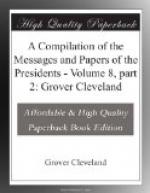My principal objection to the bill is that it contains appropriations for purposes not for the common defense or general welfare, and which do not promote commerce among the States. These provisions, on the contrary, are entirely for the benefit of the particular localities in which it is proposed to make the improvements. I regard such appropriation of the public money as beyond the powers given by the Constitution to Congress and the President.
I feel the more bound to withhold my signature from the bill because of the peculiar evils which manifestly result from this infraction of the Constitution. Appropriations of this nature, to be devoted purely to local objects, tend to an increase in number and in amount. As the citizens of one State find that money, to raise which they in common with the whole country are taxed, is to be expended for local improvements in another State, they demand similar benefits for themselves, and it is not unnatural that they should seek to indemnify themselves for such use of the public funds by securing appropriations for similar improvements in their own neighborhood. Thus as the bill becomes more objectionable it secures more support. This result is invariable and necessarily follows a neglect to observe the constitutional limitations imposed upon the lawmaking power.
The appropriations for river and harbor improvements have, under the influences to which I have alluded, increased year by year out of proportion to the progress of the country, great as that has been. In 1870 the aggregate appropriation was $3,975,900; in 1875, $6,648,517.50; in 1880, $8,976,500; and in 1881, $11,451,000; while by the present act there is appropriated $18,743,875.
While feeling every disposition to leave to the Legislature the responsibility of determining what amount should be appropriated for the purposes of the bill, so long as the appropriations are confined to objects indicated by the grant of power, I can not escape the conclusion that, as a part of the lawmaking power of the Government, the duty devolves upon me to withhold my signature from a bill containing appropriations which in my opinion greatly exceed in amount the needs of the country for the present fiscal year. It being the usage to provide money for these purposes by annual appropriation bills, the President is in effect directed to expend so large an amount of money within so brief a period that the expenditure can not be made economically and advantageously.
The extravagant expenditure of public money is an evil not to be measured by the value of that money to the people who are taxed for it. They sustain a greater injury in the demoralizing effect produced upon those who are intrusted with official duty through all the ramifications of government.
These objections could be removed and every constitutional purpose readily attained should Congress enact that one-half only of the aggregate amount provided for in the bill be appropriated for expenditure during the fiscal year, and that the sum so appropriated be expended only for such objects named in the bill as the Secretary of War, under the direction of the President, shall determine; provided that in no case shall the expenditure for any one purpose exceed the sum now designated by the bill for that purpose.




